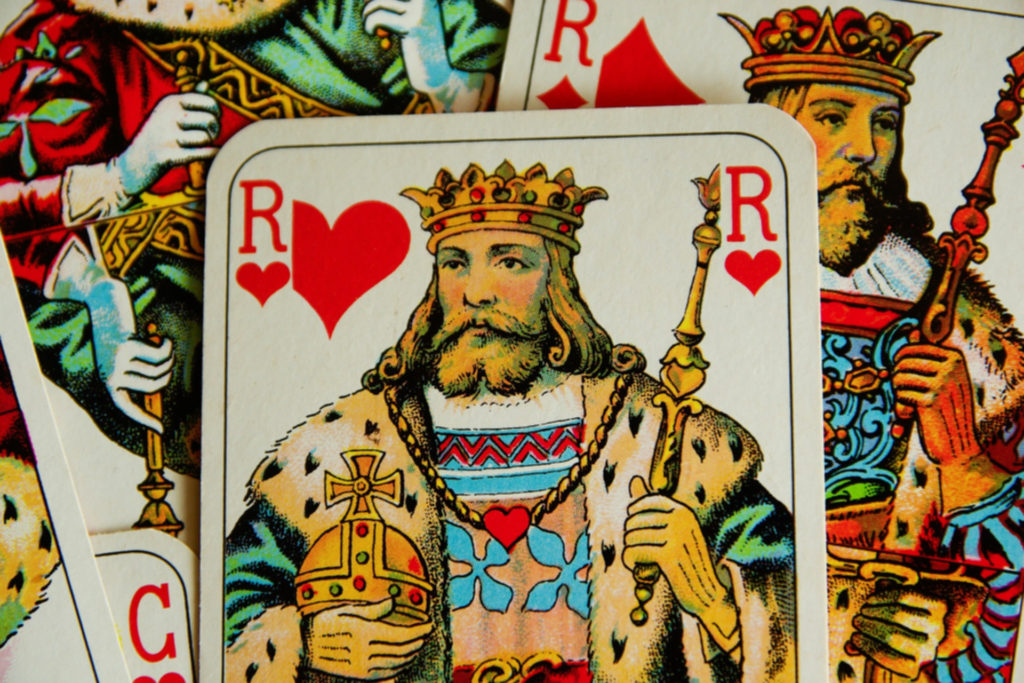
Last fall my wife and I were in New Orleans for a wedding. It was late October and the weather was amazing down there. We don’t usually go shopping on a trip, but we had two missions: first, find pralines and clusters from Southern Candymakers, and then bag a couple of souvenirs for the families taking care of our kids and our dog.
We walked Decatur Street past the draft horses, and mules, and their carriages. We cooled our heels on a bench in Jackson Square. We smelled the coffee and beignets as we passed Cafe Du Monde. A little farther on was a shop smelling of spices and resin with a beaded curtain. I went in while my wife stayed outside, a better steward of her lungs than I.
There were votive candles, herbs and stones, skulls, feathers and vials of extracts. There was a library in the back with books on on dream symbology, modern and historic pagan practices, the history of voodoo in Louisiana and loads more. I bought a tarot deck for eighteen dollars and ninety-five cents. Later we found the candy shop and some Christmas ornaments in the shapes of shrimp and crawfish.
We had a good trip. My wife and I have had the good fortune to travel around a lot over our twenty years together. We get at each other’s throats from time to time, but much less than we used to. And, notably, when we travel these days, we have very few arguments. At home we lock horns more often. Usually this is just a simple slip-up, or a quick argument about what business might call “best practices.” I get flustered, mad, really grouchy. Soon it’s over. I apologize, she does too. Usually we’re just talking things through, but it’s amped-up mad-talking.
But sometimes my temper really betrays me. It happens when I flip out and yell at my kids. They’re great kids, and it doesn’t happen a lot. But enough that it worries me. I’m not talking about calling loudly from room to room or the rise in volume that happens when no one has their hats or coats on yet and it’s time to move out. It’s me boiling over for almost nothing.
They are ten and seven years old, and they don’t deserve it. I raise my voice. I’ll probably swear. I’ll jab my finger. I’ll throw a proper fit. Aren’t I the adult, aren’t I in charge? I’m the dad, right? Sometimes dads yell at their kids, I saw it on TV. But I hate having done it.

One night I had bellowed at my son for some dumb thing. The poor kid even shed a tear by the time I had finished my rant. I didn’t insult him, call him names or run him down. But I was harsh. And I guarantee he felt under attack. I instantly regretted the whole thing, and I wished I could take it all back. And it could have easily been avoided. Should have been. I apologized for yelling and losing my temper. We watched some TV together, read a story before bed, and I apologized again. He said not to worry. But I do worry. Why does my temper flare up so thick that it eclipses my other feelings? Why didn’t I feel that heartbreaking love, that compassion until after I had said my infuriated piece? And how could I possibly rein in my temper? And didn’t I start this off with a story about a souvenir tarot deck?
Is this going to be a story about how a tarot reading gave me answers and solved my problems? I didn’t expect it to, but maybe I hoped it would help. Maybe I wanted it to give me something. So, I pulled it from the desk drawer and set to it.
I didn’t know how to do a tarot reading, though. So, I flicked my computer to life and, because I am hip, I looked up tarot reading on YouTube, everyone’s first step in looking for meaning in the storm of life. I found out that step one was getting to know your deck.
This deck was seventy-eight cards. Fifty-two you know from poker, another four face cards that almost survived in the poker deck, the Cavaliers, and then twenty-two more esoteric cards known as Major Arcana. This was checking all my boxes, and it was distracting me from my guilt at having lost my shit over nothing and making my boy cry. So I went through the deck.
I looked at the images, the symbols and the minor differences: a white or yellow or blue sky; a background of ocean, desert or mountains; a character in pain, ecstasy or resolve. As an artist and a student of art history, it was already getting thinky in my brain. I looked at them all. I read the tiny booklet that came with the cards. It revealed the surprisingly cool history of tarot and of the woman who illustrated this version of the deck. More distraction, good thing, too. Next step, shuffling.
Shuffle the deck. Simple. But I was instructed by YouTube to meditate on the question that I was to ask as I shuffled and drew the cards.
The Question.
The woman in the tutorial clearly didn’t know how devastating this step must be to me. Coming up with the right question? Isn’t that the providence of philosophers and psychoanalysts? But I tried.
I thought about my losing my temper, I shuffled those cards.
Shuffle, shuffle, shuffle.
It’s obvious, isn’t it? I thought. It’s not just wrong, it’s stupid, it’s idiotic, counter-productive, rude and cruel to shout at a child until he cries.
Shuffle, shuffle, shuffle.
Certainly it is true of my own child as it is of any child who may be a stranger to me. I already knew this and know it still. But how easy it was, how seamlessly I turn, like Goofy, from Mr. Walker to Mr. Wheeler, Motorist!
Shuffle, shuffle, shuffle
How effortlessly I lose control.
Shuffle shuf — wait. Now, there was something I could sink my teeth into. What did I just think? “How effortlessly I lose control.”
“Effort,” that’s what I need more of. It takes effort to put a frustrating thing in context sometimes, effort to change. Rather than remembering my love, my friendship and my responsibility to my family after I’m done crashing headlong through whatever random annoyance has just cropped up, I must make that love the first thing that I bring to the scene. That’s going to take some practice. And then there’s the “control.” Without it, I slip, I flip, I start swearing. Would that be trickier than effort?
How much control do I have in the first place? Last year I read Yuval Noah Harari’s book Homo Deus and Douglas Hofstadter’s book, I Am a Strange Loop, and neither paints a very pro-free-will picture of human decision making. Each makes the observation that our emotions, our thoughts and our choices are products of stimuli and experience and the corresponding biochemical reactions in the brain. They write that our minds, our selves, are a running loop of an algorithm formed by evolution, experience and random mutations.
But, they are “reactions.” That’s the part I love. Our brains react to what is around us, what we experience. It’s how we learn from mistakes, and how we can come to the task of bettering ourselves to change our behavior, to change the way we react to stimuli and experience. I wanted a novel stimulus; hopefully I could fine-tune my algorithm a little by trying something new here.
Let us see, mon ami, how the little gray cells react to some mystic cards and a meditation on control.
Now, to finish the reading. My deck was well shuffled and I asked the question, “How do I control myself?”
I drew the cards finally, took in the images, read the titles and checked out the notes in the little booklet that recommends some possible interpretations of them. My reading offered its version of my past, present and future. I was surprised by the color of the read, the potential in the names of the cards and the simplicity of the whole ritual. I felt better at the end. I gave that YouTuber another subscriber and a like.
Better still, things have been great with my son since then. Christmas was good, New Year’s was good, getting back to school was a bummer for both of us. And in the days since I have been trying to take this method — a product of guilt, oracles and biochemistry — with me when I’m with those I love, and even with strangers: Get to know your cards, shuffle, read and bring the love first.
– Micah Clarke